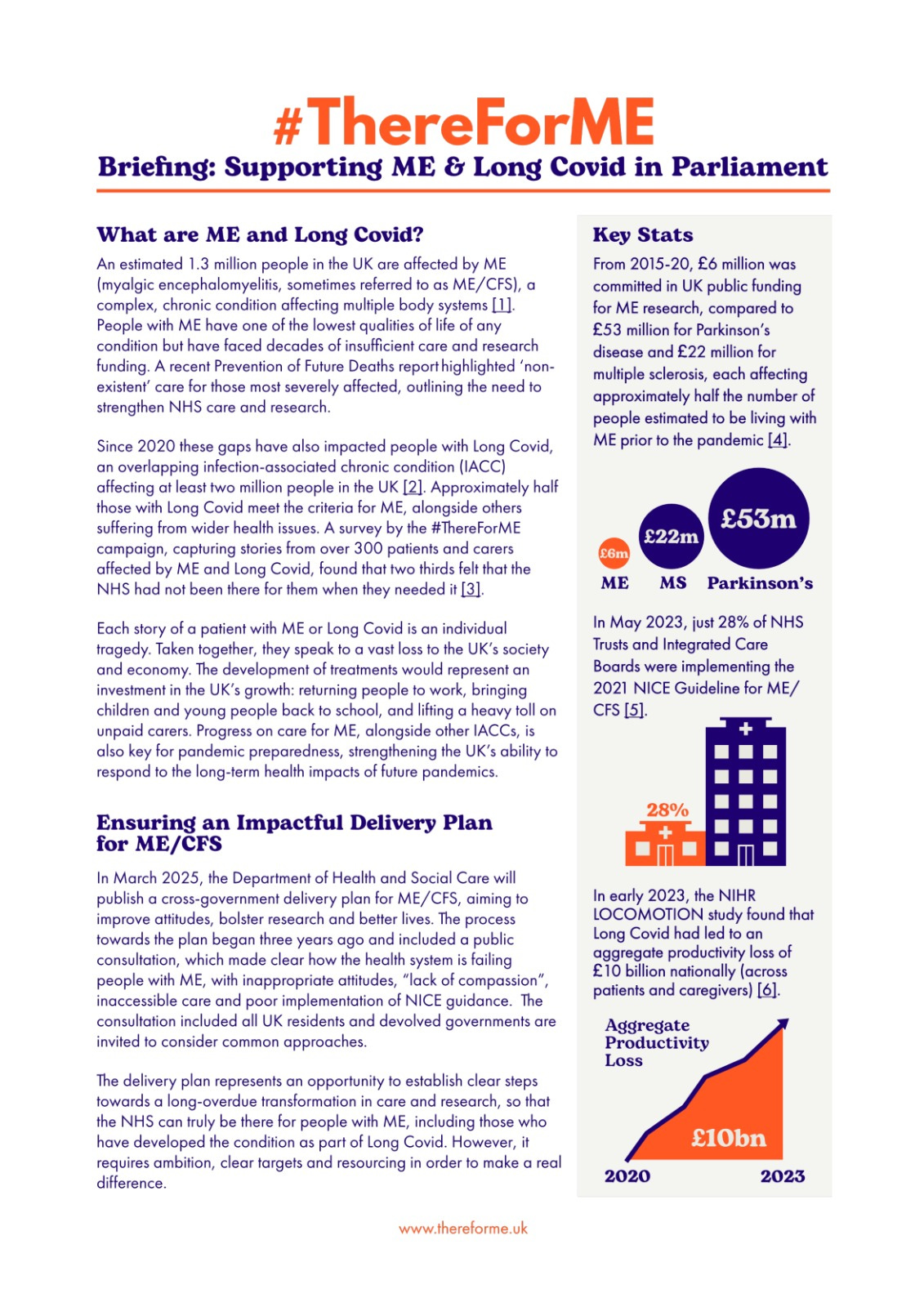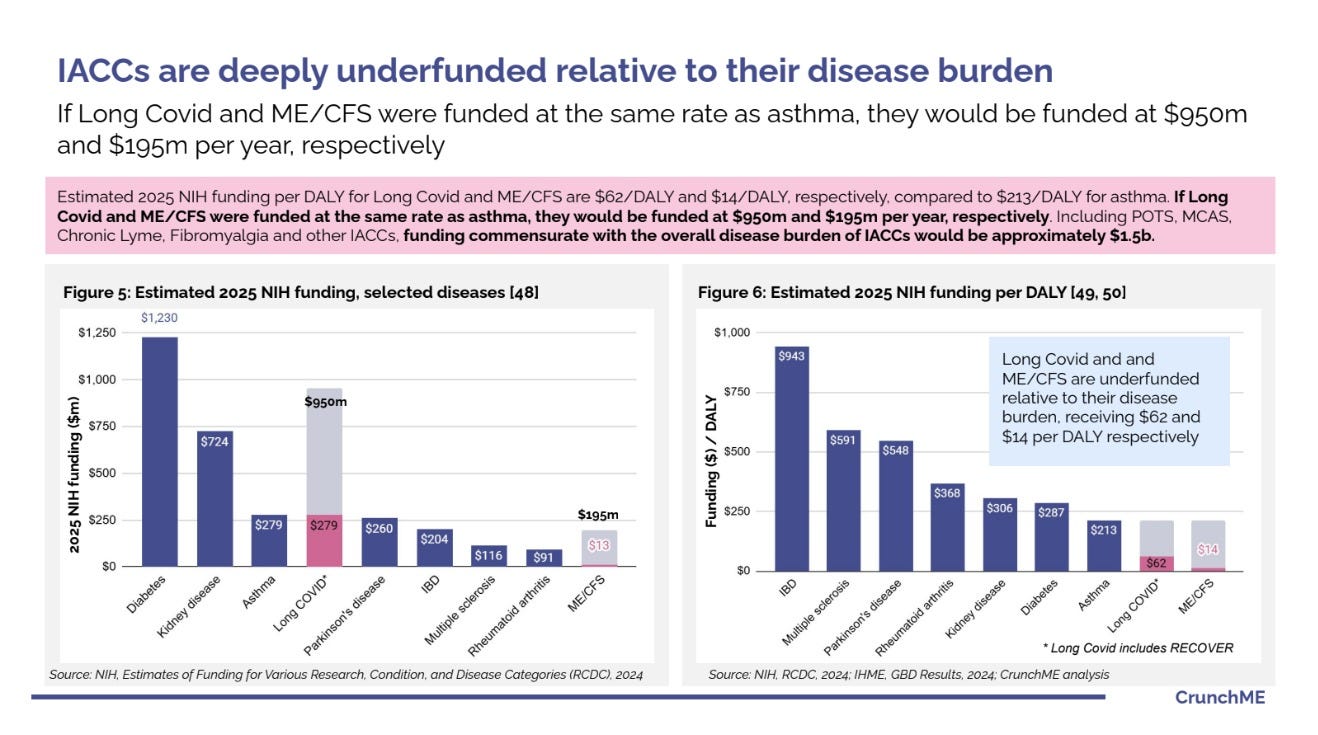Campaign update #13: Keeping up the momentum
It’s been a busy few weeks for us at #ThereForME!
As you may have seen from our recent posts our primary focus remains the Delivery Plan, but we’ve also had some other work in the mix. This week we bring you a few updates from #ThereForME and friends, as well as some ways you can get involved.
The Delivery Plan for ME/CFS
The past few days have seen some changes at the Department of Health and Social Care. It has now been confirmed that Ashley Dalton has replaced Andrew Gwynne as the government’s newest health minister, taking over his portfolio and with it ME.
We’ll be watching closely to understand better what this means for the long-anticipated Delivery Plan for ME/CFS. We’ll be reaching out this week to explain why the Delivery Plan must remain a priority under new leadership. A change in minister shouldn’t mean a loss of momentum and we will continue to push for the plan to be published without further delays.
With this recent change, now is an ideal time to write to your MP and help keep the delivery plan on track (energy permitting)! We’ve put together an updated MP briefing and refreshed our letter template to make it easier for you to reach out - although we’d always recommend personalising your message as much as you’re able.

It’s worth mentioning that writing to your MP really can make a difference. Of course some messages will be ignored, but sometimes they reach a sympathetic ear and someone who is willing to take action. The more they hear from you, the more likely it is to make an impact!
Our work on the Delivery Plan also continues behind the scenes. Binita and Karen will be attending the final Task and Finish group meeting for the Delivery Plan this Wednesday and we’ll be continuing to reach out to allies across parliament.
Join the conversation on accessible care
We recently partnered with Patient Safety Learning on a blog exploring the barriers to NHS care for people with ME and Long Covid. These challenges go beyond a lack of specialist support - to how care for other conditions can simply be inaccessible with energy limitations.
A huge thank you to everyone who used valuable energy to share their experiences. The issues you raised were very familiar, but that doesn’t make it any less sad to read your responses.
Most importantly, there’s still time to join the conversation. We’ll be following up with Patient Safety Learning soon to discuss a follow-up piece based on your experiences.
Some reads from friends of #ThereForME
We aren’t the only ones keeping busy lately! Our friends at Crunch ME have just released an insightful new policy report. It’s well worth a look for data-driven insights and a compelling case for increased attention to Infection-Associated Chronic Conditions (IACCs).
We also wanted to highlight Dr. Jo Greer’s lovely Red Leaf Blog, where she writes about victories and glimmers of hope in the ME community - ‘red leaves.’ Her two most recent posts feature messages of hope and solidarity from leading clinicians and scientists researching ME, Long Covid, and other IACCs. We loved this one from Dr Asad Khan.
So, as you can see, there’s plenty happening! With the recent change in minister, our top priority is to ensure the Delivery Plan remains a focus under new leadership. And you can help us. Whether it’s writing to your MP, engaging with our Patient Safety Learning blog, or sharing your thoughts on social media, every action helps maintain the momentum. Keep up the fight and so will we.
We’ll see you next week.







Thanks for the update. The key thing for anything to change is the issue of government funding. If the Department of Health plan doesn't commit to extra funding then it won't be worth the paper it's written on.
At a recent public consultation held by the West Yorkshire ICB on the NHS 10 year plan the number 1 issue raised by members of the public was extra funding. Without that the best plans in the world come to nothing. I don't know why the ME community wants to ignore this issue. Never mind the complete lack of moral compass displayed by this government of red tories on a whole number of important issues. Don't take any this government says at face value. We have a government committeed to the further destruction of the NHS through privatisation.
TREATMENT LINKS TO BENEFIT ENTITLEMENT
Hi, I'm new to the site. I'm interested in promoting the interests of ME/CFS patients. I live in an area which has no dedicated service/clinic for CFS/ME.
I was initially interested in improving service supply/access for local patients but had to divert my energies into applying for benefits.
Something has come up which may represent a significant difficulty for ME/CFS patients in accessing benefits going forward.
My PIP decision made 4 references to the lack of "fatigue support management", occupational therapy, physiotherapy, etc., in arriving at and justifying my award. I have been awarded the standard rate ( Iam appealing,) but this is largely justified in the award statement because of the private consultants I personally paid for when I first became unwell with CFS.
I live in East Lancs, and this NHS Trust's ME/CFS policy is that treatment is provided by GPs.
My GP has tried 4 times over 6 years to refer me into the NHS for support/ treatment, and in all cases referral has been refused on the basis of lack of specialism.
I am now applying for Universal Credit. I am presented with the same difficulty - of not being able to have my condition confirmed by anyone other than my GP.
The DWP via the privately run Health Assessment Agency, does not appear to accept GP evidence.
I am wondering how many other CFS/ME patients are experiencing difficulties accessing benefits because of the absence of NHS services in their region.
I'm also wondering if this constitutes a legal prejudice. We are in effect being held responsible/prejudiced by the act or omission of another agency (the NHS), over which we have no control. Does anyone know what the legal/DWP position is for disabilities that cannot provide clinical proof due to lack of NHS provision.